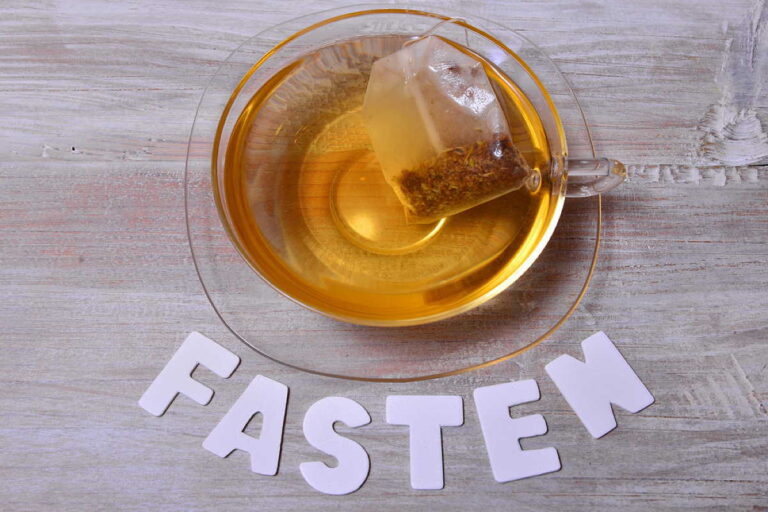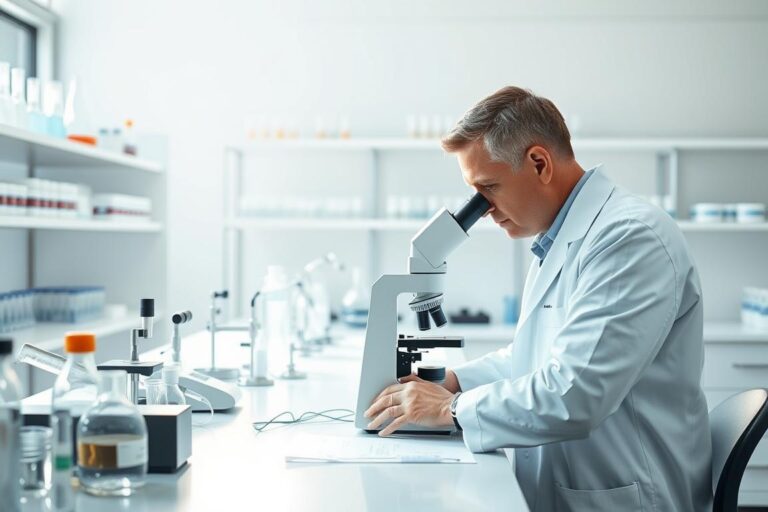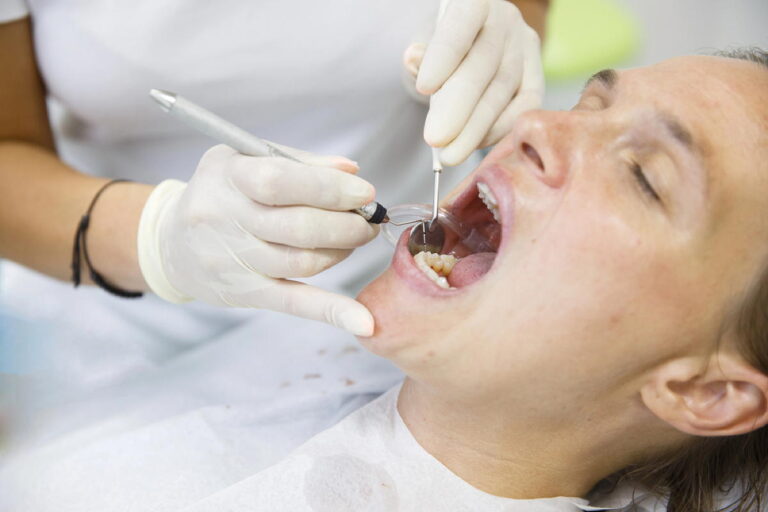Hormone balance and healthy ageing: What really matters
Did you know that the human body produces around 50 different hormones? A hormonal imbalance can cause a range of symptoms, including mood swings, blemished skin and fatigue. According to Dr. Peter Tessarz of the Max Planck Institute for Biology of Ageing, healthy ageing begins before birth. Prenatal factors such as stress and the mother’s diet can increase the risk of age-related diseases such as diabetes or strokes.
Our understanding of endocrine health is critical to guiding the processes of healthy ageing. Ageing research investigates how cell damage caused by environmental influences can be less easily repaired in old age. The role of hormones such as progesterone, oestrogen and testosterone is also important, as these have a significant influence on the ageing process.
Key findings
- 🧬 The human body produces around 50 different hormones 💡.
- ⚖️ A hormonal imbalance can cause symptoms such as mood swings 😠😢 , blemished skin 🧖♀️ and exhaustion 😴.
- 🌿 Progesterone has a calming effect 😌 – a lack of it can lead to depression 😔.
- 💧 Low oestrogen levels can lead to low moods 🌧️.
- 💪 Testosterone supports muscle growth and a positive attitude to life 😎 – but a deficiency often goes unnoticed 🕵️♂️.
Introduction to hormone balance
Hormone balance is crucial for healthy ageing and our general well-being. The more than 50 different hormones that our organs produce control many important functions in our body. A balanced hormone balance not only influences physical health, but also plays a key role in regulating our mood and energy levels.
An imbalance in our hormonal system can lead to numerous health problems, such as irregular menstrual cycles, mood swings and skin problems. One well-known example is progesterone, the so-called “calming hormone”. If it is not metabolized sufficiently, this can lead to depression. A lack of oestrogen in the first phase of the cycle can also cause low moods.
Testosterone, which is often only associated with the male body, also plays an important role for women. Testosterone supports muscle growth and influences sex drive. Other important hormones such as oxytocin, the “cuddle hormone”, which is produced in the hypothalamus, contribute to the ability to empathize. A lack of oxytocin can impair this ability.
In addition, the thyroid hormones T3 and T4 are crucial for the metabolism. The stress hormone cortisol, which is produced in the adrenal glands, helps us to react to stressful situations. However, an excessive release of cortisol can have a negative impact on the production of sex hormones.
“A balanced diet and regular exercise are essential to regulate the hormone system and support hormonal health.”
A balanced diet can help to promote hormonal health by providing essential vitamins and trace elements. Regular exercise also promotes the release of dopamine, serotonin and endorphins, all of which play an important role in our well-being.
In summary, hormone balance influences many aspects of our health and quality of life. Consciously maintaining this balance is therefore of great importance.
The importance of hormonal health for a long life
Hormonal health plays a crucial role in a long life. Hormones control important bodily processes such as energy, sleep and metabolism. An imbalance in hormone levels can significantly affect general well-being and health, which is why a balanced hormone status is essential.
Connection between hormone balance and ageing processes
The hormone balance has a significant influence on the ageing process. Hormones such as insulin, growth hormones and sex hormones regulate cell functions and metabolic processes that maintain both physical and mental performance. For example, a lack of thyroid hormones can lead to tiredness and weight fluctuations, while a constant excess of cortisol, the so-called “stress hormone”, can promote sleep disorders and cardiovascular diseases.
Important hormones that influence ageing
Different hormones have different effects on the ageing process. Testosterone affects libido, muscle growth and bone health, while oestrogen is responsible for female sexual characteristics and bone health. Progesterone can mitigate the effects of stress, and oxytocin, the ‘cuddle hormone’, plays a role in social bonding and emotional health.
| Hormone | Function | Effects of imbalance |
|---|---|---|
| Insulin | Regulation of the blood sugar level | Hyperglycemia or hypoglycemia |
| Testosterone | Libido and muscle growth | Less sexual interest, tiredness |
| Oestrogen | Female sexual characteristics | Skin and hair problems |
| Progesterone | Stress management | Depressive moods |
| Cortisol | Stress reaction | Sleep disorders, heart problems |
The measurement of hormone status should be considered in the event of complaints such as sleep problems, headaches or unexplained weight gain or loss. An examination, usually by taking a blood sample, provides results within a week and can help to regulate the hormone balance in a targeted manner.
Causes of hormone imbalances
A hormone imbalance can be caused by a variety of factors. Common causes of hormonal imbalances include an unhealthy diet, stress, environmental influences and genetic predispositions. Our organs produce around 50 different hormones, the fine balance of which is crucial for our health.
One of the most common causes is the use of medication such as the contraceptive pill, which can disrupt natural hormone production. Common side effects include irregular menstrual cycles, bleeding between periods, deterioration of the skin, exhaustion and mood swings. A lack of vitamin D3 can also have a negative impact on the production and regulation of other hormones.
Stress is also a significant factor. Stress hormones such as adrenaline and cortisol are increasingly released and impair the production of the sex hormones oestrogen and testosterone. Cortisol also reduces melatonin production, which can have a negative impact on sleep quality.
Environmental influences such as pesticides, plasticizers and parabens also contribute to hormonal imbalances. These substances can have a negative impact on hormone production and lead to hormonal imbalances. Typical symptoms of such imbalances are irregular menstrual cycles, depression, sleep disorders, fatigue, hair loss, infertility, digestive problems and unstable weight.
Genetic factors that explain individual differences in hormone production and regulation are also important. Individual laboratory tests can help to determine deficits and surpluses in the hormone balance and address them in a targeted manner.
A balanced diet and regular exercise play a key role in restoring hormonal balance. Vitamins and trace elements such as zinc and vitamin D3 are essential for hormone production. Exercise can promote the release of dopamine, serotonin and endorphins, which in turn has a positive effect on hormone balance.
Keeping hormones in balance: Tips and strategies
Maintaining a healthy hormonal balance is crucial for our well-being and general health. Through targeted nutrition, efficient stress management and sufficient sleep, we can achieve positive effects on our hormone balance.
Dietary recommendations and nutrient intake
A balanced diet plays a key role in regulating our hormones. Foods such as linseed, pumpkin seeds and dark chocolate (at least 70% cocoa) can support hormone balance. Legumes and pomegranate are also beneficial. Antioxidants such as vitamins C and E as well as magnesium help to prevent hormonal fluctuations.
A high-fibre diet stabilizes the hormone balance and reduces the risk of hormone-related complaints. Monk’s pepper can also help to alleviate the symptoms of premenstrual syndrome in women.
Stress management and its influence on hormones
Effective stress management is essential, as chronic stress can significantly affect hormone balance. Techniques such as meditation, yoga and regular physical activity can help to reduce stress. It is also advisable to monitor caffeine consumption, as too much caffeine stimulates the release of cortisol and adrenaline and can disrupt hormonal balance.
Prolonged endurance training (more than 80 minutes) can also have a negative effect on the hormone balance, whereas regular, moderate exercise supports the balance of hormones such as insulin and cortisol.
The influence of sleep and rest on hormonal health
Healthy sleep is one of the most important factors for hormone balance. Less than 7-8 hours of sleep per day can affect the release of hormones responsible for regeneration and growth. Low magnesium levels can lead to insomnia and anxiety, which in turn can affect hormone balance.
Low oestrogen levels can lead to sleep disorders and hot flushes at night, while chronic fatigue can indicate an imbalance of thyroid hormones or too little cortisol. Therefore, regular and quality sleep is crucial for hormonal balance.

| Factor | Effects on hormones |
|---|---|
| Linseed, pumpkin seeds, dark chocolate | Promotion of the hormone balance |
| Antioxidants (vitamin C, E, magnesium) | Prevention of hormonal fluctuations |
| Monk’s pepper | Relief of PMS symptoms |
| Stress management | Reduction of cortisol, adrenaline |
| Healthy sleep | Promotion of regeneration and growth |
| Caffeine | Increase in cortisol level, stress reactions |
The effects of hormonal changes on ageing
Hormone changes over the course of a lifetime have a significant impact on ageing and health and well-being. With increasing age, the production of growth hormone (GH) and dehydroepiandrosterone (DHEA) decreases continuously. These changes contribute to a decrease in muscle mass and an increase in body fat, which increases the risk of age-related diseases such as osteoporosis and diabetes.
One example is polycystic ovary syndrome (PCOS), which is characterized by increased production of male hormones in the ovaries and can lead to infertility. From the age of 40, testosterone levels in men fall by 1 to 2 percent each year, which can lead to a reduction in libido and muscle mass.
The production of thyroid hormones also influences the ageing process. Hyperthyroidism, often caused by Graves’ disease, can cause symptoms such as tremors, palpitations and weight loss. In contrast, hypothyroidism leads to tiredness and listlessness. These hormonal changes not only affect physical well-being, but also mental health.
| Hormonal change | Effects |
|---|---|
| Insulin | Regulates blood sugar levels, high levels increase the risk of diabetes |
| Oestrogen | Fluctuating levels can cause menopausal symptoms |
| Testosterone | Reduced levels lead to muscle loss and loss of libido |
| Growth hormone (GH) | Decrease reduces muscle mass and promotes fat accumulation |
| DHEA | Decreases after the age of 40, influences well-being and sexuality |
| Cortisol | Excess leads to high blood pressure and muscle weakness (Cushing’s syndrome) |
These complex hormonal changes are a major contributor to ageing and highlight the need for a personalized treatment strategy to support hormonal health. A balanced diet, regular exercise and monitoring hormone levels can help to positively influence ageing.
Hormonal changes in women in old age
Women experience significant hormonal changes in their mid-40s, particularly the decline in estrogen and progesterone. These hormonal changes in women can lead to a variety of symptoms that can significantly affect quality of life.
Menopause and its effects
During the menopause, also known as the menopause, there is a drastic drop in oestrogen and progesterone levels. These hormonal changes in women are often responsible for symptoms such as hot flushes, sleep disturbances and mood swings. A lack of oestrogen is often associated with hot flushes and insomnia, while a lack of progesterone can lead to irregular menstrual cycles and premenstrual symptoms. These changes can have a major impact on physical and emotional health.
Strategies for alleviating menopausal symptoms
There are various strategies to relieve menopausal symptoms and mitigate the effects of the menopause. One approach is hormone replacement therapy (HRT), which helps to balance the reduced hormone levels and reduce symptoms. In addition to HRT, natural treatment options such as taking phytoestrogens, found in foods such as soy and flaxseed, can also help support estrogen levels.
Other effective strategies include:
- Regular strength training: This stabilizes the hormone balance, improves bone density and strengthens the muscles.
- Balanced diet: A diet rich in antioxidants, healthy fats and proteins supports hormonal health. Omega-3 fatty acids reduce inflammation and promote brain health.
- Stress management: Relaxation techniques such as meditation, yoga or mindfulness exercises can help to reduce stress levels and thus promote hormonal balance.
By integrating these strategies into their everyday lives, women can better manage the symptoms of the menopause and improve their quality of life.
Hormonal changes in men in old age
With age comes not only external changes, but also hormonal adjustments within the body. Hormonal health in men, particularly as it relates to andropause, plays a central role in overall well-being and quality of life as men age. A better understanding of these changes and how to treat hormonal imbalances can help men lead active and healthy lives.
Andropause and its effects
Andropause, often referred to as the male “menopause”, describes a condition in which the testosterone level in the blood gradually decreases. This hormonal change often affects men from the age of 40. Testosterone deficiency or hypogonadism can lead to symptoms such as erectile dysfunction, reduced sex drive, fatigue and a decline in physical performance. Statistically, testosterone levels in men decline continuously from the age of 30. In addition, serious or chronic illnesses as well as lifestyle factors such as severe obesity, dieting or excessive alcohol consumption can also have a negative impact on testosterone levels.
How men can improve their hormonal health
There are various strategies to promote hormonal health in men and mitigate the effects of andropause:
- Dietary changes: A balanced diet, rich in nutrients and vitamins, supports hormone production. In particular, foods rich in zinc and magnesium can promote testosterone production.
- Exercise: Regular physical activity, especially strength training, can increase testosterone levels and promote muscle building.
- Stress management: Chronic stress can have a negative impact on hormone levels. Techniques such as meditation and yoga can help to reduce stress levels.
- Medical advice: Hormone therapy can be considered if there is a pronounced testosterone deficiency. However, this should be carried out under medical supervision as it can be associated with risks, such as an increased likelihood of prostate cancer or heart problems.
- Improve sleep quality: Adequate and restful sleep is important for hormone balance. A lack of sleep can reduce testosterone production.
Maintaining hormonal health in men requires a holistic approach that includes lifestyle adjustments and possibly medical interventions. Through proactive management and conscious choices, men can mitigate the effects of andropause and lead a healthy and active life.
The role of exercise in hormone regulation
Regular physical activity plays a crucial role in maintaining a healthy hormonal balance and improving metabolism. Exercise improves the insulin sensitivity of muscle cells, which leads to better glucose uptake and more stable blood sugar control. Intense physical activity can also stimulate the production of testosterone and growth hormone, which are essential for muscle building and recovery.
Myokines, which are released by muscle cells during contraction, also help to improve insulin sensitivity and reduce inflammation. This interaction clearly shows how exercise contributes to hormone regulation. Moderate exercise can also regulate levels of stress hormones such as cortisol, while intense exercise can lead to an increase in cortisol secretion.
In addition, aerobic activity stimulates the parasympathetic nervous system, which helps to reduce stress hormones and promotes the release of happiness hormones such as serotonin and endorphins. A balanced diet that supports muscle building is also crucial for maintaining a healthy hormone balance. Exercise can have a lasting positive effect on bodily functions such as metabolism, insulin sensitivity, muscle building and stress regulation.
The hormone system regulates central functions such as metabolism, sleep, stress management and the immune system. A regulated blood sugar level, increased muscle strength and a healthy stress level are therefore essential aspects that can be promoted through targeted exercise. This shows how important regular exercise is for efficient hormone regulation and general well-being.
Techniques and therapies for hormone regulation
Hormone regulation plays a crucial role in well-being and health, especially in ageing. There are various approaches to supporting hormone balance, from traditional hormone therapy to naturopathic methods. Each method has its own advantages and disadvantages that need to be taken into account.
Hormone therapy: advantages and disadvantages
Hormone therapy is a proven method of treating hormonal disorders. It includes various forms, including depot injections, testosterone gels and testosterone patches. The main advantage of hormone therapy is its effectiveness in treating serious hormone deficiencies such as hypogonadism, a common hormone disorder in men. Typical symptoms of testosterone deficiency are persistent fatigue, depressive moods, loss of drive, decreasing muscle strength and changes in body weight.
From the age of 40, the body’s own testosterone production decreases by around 1 to 1.2% each year. Testosterone replacement therapy can help here by increasing the testosterone level in the serum. However, hormone therapy also comes with possible side effects, such as the risk of cardiovascular problems or prostate cancer.
Regular medical check-ups are necessary to monitor testosterone levels and detect possible side effects at an early stage. Hormone disorders are typically diagnosed using a combination of medical history, physical examination and blood tests.
Naturopathic approaches to hormone regulation
A healthy lifestyle is essential for naturopathic hormone regulation. This includes regular exercise, a balanced diet and effective stress management. Pumpkin seeds and linseed play an important role thanks to their ingredients such as tryptophan and phytoestrogens. These nutrients can help to improve hormone balance.
Seed cycling is used by many women to treat hormonal imbalances. It can help to alleviate menstrual cramps, irregular periods and even symptoms of menopause such as insomnia and hot flushes. Women using hormonal contraceptives should note that the effects of this naturopathic method may be less as their hormones are already controlled by external sources.
Sesame and sunflower seeds support progesterone production and are rich in important nutrients such as magnesium and selenium. Reducing stress and getting enough sleep, at least 7 hours a night, are also important factors for a healthy hormone balance.
Finally, dietary supplements such as vitamin D3, omega-3 fatty acids and B vitamins can support hormone production. These approaches are largely free of side effects and offer a natural alternative to traditional hormone therapy.
The future of hormone research and healthy ageing
Hormone research has made considerable progress in recent years, particularly in the treatment of hormonal imbalances and their effects on ageing. Hormones influence different stages of life, from birth to death, and play a central role in growth, sexuality and stress responses. However, hormonal imbalances can cause significant health problems that require targeted treatments.
The future of ageing could be shaped by innovative treatment approaches based on the latest findings in hormone research. The global market for hormone replacement therapies is expected to grow to USD 22 billion by 2026. However, these therapies must be individually tailored to specific conditions and patient needs as they are not universally effective. For example, testosterone deficiency affects around 2% to 4% of men over 40, while menopause affects nearly 80% of women aged 45 to 55.
Hormone research has also provided important insights into the prevalence of hormonal disorders, such as hypothyroidism, which affects around 5% of the population, or polycystic ovary syndrome (PCOS), which occurs in 6% to 12% of women of reproductive age. With the ongoing development of new diagnostic and therapeutic techniques, the quality of life in old age could be significantly improved and longevity promoted. This shows that the future of ageing is closely linked to advanced hormone research and personalized treatment strategies.






